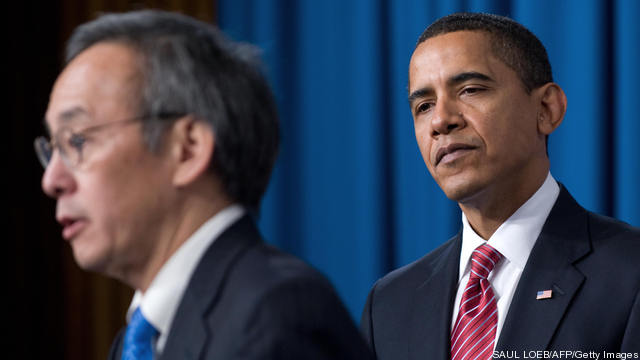
For the third year in a row energy played a central role in President Obama’s State of the Union address, with the president leaning hard this year on the twin themes of increased domestic oil and gas production and the need to invest more in renewable sources. “Right now, American oil production is the highest that it’s been in eight years,” said Obama. “Not only that — last year, we relied less on foreign oil than in any of the past sixteen years.” Obama has indeed presided over a boom in domestic energy production since taking office. From 2008 to 2011 U.S. crude oil production has jumped 14%, going from 5.1 million barrels per day at the start of 2008 to nearly 5.8 million barrels per day currently, according to the U.S. Energy Information Administration.
Obama
Sign up and get Breaking Energy news in your inbox.
We will never sell or share your information without your consent. See our privacy policy.
The US “is on the cusp of an energy boom that is already creating hundreds of thousands of jobs, revitalizing entire communities, and reinvigorating American manufacturing,” said US Chamber of Commerce President and CEO Thomas Donohue as he laid out the Chamber’s priorities for 2012.
In his annual “State of American Business” report, delivered Thursday in the Italianate Hall of Flags in the Chamber’s Lafayette Square headquarters, Donohue highlighted energy first as a sector offering vast promise in jobs and revenue to help revitalize the US economy, but only if domestic resources are developed. Keep reading →

Energy issues aren’t popping up much yet in election year discussions and debates, but if the American Petroleum Institute gets its way, they will be.
API President and CEO Jack Gerard told a luncheon in Washington, DC Wednesday that the oil and gas lobby is launching a nationwide “conversation with the American people” called “Vote for Energy.” Keep reading →

Infrastructure has been one of the defining terms for the energy sector in 2011, and it is set to define the industry’s major financial and regulatory debates in the coming year.
Generating, transporting and delivering energy is by its nature an infrastructure-heavy operation, perhaps along with the linked sectors of water and transportation the most consistently infrastructure-intensive activity modern societies engage in. Keep reading →

Well, that was painful. The House and Senate on Friday finally approved and President Obama signed into law a short-term extension of the payroll tax cut and federal unemployment benefits, and staved off a steep cut in pay to Medicare doctors. But, once again, Congress took a tortured path. And on legislation that, in the scheme of things, was a modest stopgap measure whose main provisions enjoyed bipartisan support. After nearly a week of adamant House Republican opposition, Speaker John Boehner relented Thursday night, announcing that he and Senate Majority Leader Harry Reid had struck a deal on a bill that the Senate passed on Dec. 17. This article is a linkout. Photo Caption: Air Force One lifts off shortly after President Obama signs the Payroll Tax Cut Extension.

At a press conference on Dec. 7, President Obama warned congressional Republicans not to attach a controversial crude oil pipeline from Canada through the U.S. to a bill extending a year-old break on people’s payroll tax. “Any effort to try to tie Keystone to the payroll tax cut, I will reject,” the president said, standing next to his Canadian counterpart, Prime Minister Stephen Harper. Ten days later, Republicans, with the help of sympathetic Democrats and lawmakers who just wanted to get a deal done, did just that. By a vote of 89 to 10, the Senate voted on Saturday morning to extend the payroll tax cut for two months. Included in the bill was language requiring the State Department to issue a permit within 60 days to proceed with the 1,700-mile oil pipeline. The inclusion, on its surface, goes directly against the president’s veto threat. But the White House has no plans to torpedo the measure. At a briefing with reporters following a short statement by the president, senior administration officials made the case that their position on the pipeline had not been affected. This article is a linkout.

Energy politics have been more partisan than ever this year.
Republicans have been consistently supporting incumbent fossil fuel electricity generators–nuclear, coal and natural gas–while Democrats have been vocally supporting emissions regulations, renewables loan guarantees and tax incentives as well as increased taxes on oil and gas companies. Keep reading →

Hundreds of millions of federal dollars from a flagship clean energy grant program were awarded to projects that were well under way before Barack Obama was inaugurated, despite the aim of the 1603 grant program to “primarily” stimulate new projects.
“When the financial crisis hit many developers found that they didn’t have the tax liability that would allow them to claim the credits, so the program was developed to offer an alternative way to continue to incentivize renewable energy development,” a Treasury spokeswoman said. “So, the 1603 program was primarily meant to incentivize new renewable energy projects, but it also supported some existing investments.” Keep reading →


Energy Voters As A Political Power: AOL Energy Comment
By Peter GardettCan the millions of workers in the US energy sector, their families and neighbors, and the millions more whose lives are built on energy activities, be convinced to vote their concerns about an industry?
In other democracies workers in individual sectors often view their politics through their professional and industrial identities, while many recent election races in the US have hinged on political identities rooted in social values as much as economic beliefs. While the US energy sector remains one of the country’s largest employers and most visible sources of economic vibrancy, its natural constituents rarely raise its issues in their lists of concerns politicians (and presidential hopefuls) should address. Keep reading →